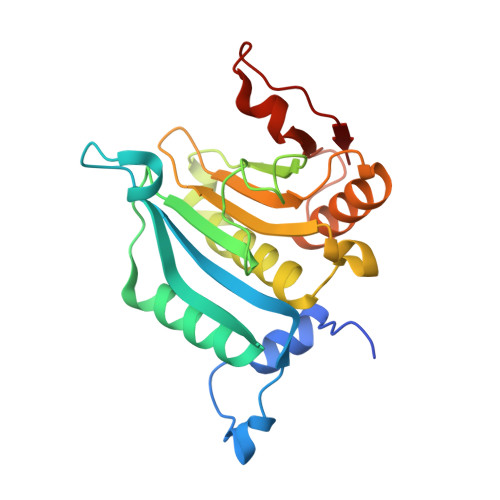Integrating fragment-based screening with targeted protein degradation and genetic rescue to explore eIF4E function.
Sharp, S.Y., Martella, M., D'Agostino, S., Milton, C.I., Ward, G., Woodhead, A.J., Richardson, C.J., Carr, M.G., Chiarparin, E., Cons, B.D., Coyle, J., East, C.E., Hiscock, S.D., Martinez-Fleites, C., Mortenson, P.N., Palmer, N., Pathuri, P., Powers, M.V., Saalau, S.M., St Denis, J.D., Swabey, K., Vinkovic, M., Walton, H., Williams, G., Clarke, P.A.(2024) Nat Commun 15: 10037-10037
- PubMed: 40016190
- DOI: https://doi.org/10.1038/s41467-024-54356-1
- Primary Citation of Related Structures:
8QM4, 8QM5, 8QM6, 8QM7, 8QM8, 8QM9 - PubMed Abstract:
Eukaryotic initiation factor 4E (eIF4E) serves as a regulatory hub for oncogene-driven protein synthesis and is considered a promising anticancer target. Here we screen a fragment library against eIF4E and identify a ligand-binding site with previously unknown function. Follow-up structure-based design yields a low nM tool compound (4, K d = 0.09 µM; LE 0.38), which disrupts the eIF4E:eIF4G interaction, inhibits translation in cell lysates, and demonstrates target engagement with eIF4E in intact cells (EC 50 = 2 µM). By coupling targeted protein degradation with genetic rescue using eIF4E mutants, we show that disruption of both the canonical eIF4G and non-canonical binding sites is likely required to drive a strong cellular effect. This work highlights the power of fragment-based drug discovery to identify pockets in difficult-to-drug proteins and how this approach can be combined with genetic characterization and degrader technology to probe protein function in complex biological systems.
- RNA Biology and Molecular Therapeutics Team, Centre for Cancer Drug Discovery, Institute of Cancer Research, London, SM2 5NG, UK.
Organizational Affiliation:




















